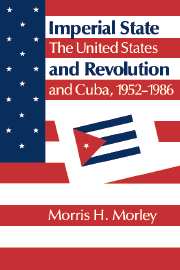Book contents
- Frontmatter
- Contents
- Acknowledgments
- 1 The U.S. imperial state: theory and historical setting
- 2 The United States in Cuba 1952–1958: policymaking and capitalist interests
- 3 The United States in Cuba 1959–1961: national-social revolution, state transformation, and the limits of imperial power
- 4 The United States against Cuba 1961-1968: politics of confrontation in Latin America
- 5 The United States against Cuba 1961–1968: politics of global economic blockade
- 6 The United States against Cuba 1968–1980: intransigent policymaking and its consequences
- 7 The U.S. imperial state: some final insights
- Epilogue. The Reagan administration and Cuba: the revival of vendetta politics 1981–1986
- Appendix 1 The impact and effectiveness of the U.S. global economic blockade on Cuban development
- Appendix 2 Tables
- Notes
- Bibliography
- Index
5 - The United States against Cuba 1961–1968: politics of global economic blockade
Published online by Cambridge University Press: 04 May 2010
- Frontmatter
- Contents
- Acknowledgments
- 1 The U.S. imperial state: theory and historical setting
- 2 The United States in Cuba 1952–1958: policymaking and capitalist interests
- 3 The United States in Cuba 1959–1961: national-social revolution, state transformation, and the limits of imperial power
- 4 The United States against Cuba 1961-1968: politics of confrontation in Latin America
- 5 The United States against Cuba 1961–1968: politics of global economic blockade
- 6 The United States against Cuba 1968–1980: intransigent policymaking and its consequences
- 7 The U.S. imperial state: some final insights
- Epilogue. The Reagan administration and Cuba: the revival of vendetta politics 1981–1986
- Appendix 1 The impact and effectiveness of the U.S. global economic blockade on Cuban development
- Appendix 2 Tables
- Notes
- Bibliography
- Index
Summary
I can't think of any instance of a policy of economic and political isolation being followed so vigorously as we followed it toward Cuba on the basis of no documents or justification under international law.
(State Department official)The aims of this chapter are to analyze how the United States under successive Democratic administrations orchestrated a global economic blockade of Cuba for political objectives, and to investigate the responses of Washington's allies – their degree of cooperation and cleavage – in the effort to apply multilateral economic pressures to corner the revolutionary regime.
Economic sanctions have been and continue to be employed by the U.S. government in attempts to disintegrate nationalist and socialist regimes in the Third World deemed inimicable to American political, economic, or strategic interests. These countries are highly vulnerable to this form of external aggression and its consequences: economic chaos, political and social unrest, and even the demise of regimes. Three major factors account for their susceptibility to economic pressures: First, most Third World countries are export-oriented, monoculture economies highly dependent on external sources of financing and trade for their day-to-day and long-term development needs; second, the U.S. holds a pivotal position within the international economy as a market for Third World products, as a source of economic assistance, and as the most powerful actor in the international lending institutions; third, there are limited alternative sources of capital and markets to which affected countries in these regions of the world can turn. But since the 1960s, the capacity of the United States to mobilize support for an economic blockade against a target country has been tempered by the emergence of an increasingly differentiated capitalist world economy.
- Type
- Chapter
- Information
- Imperial State and RevolutionThe United States and Cuba, 1952–1986, pp. 178 - 239Publisher: Cambridge University PressPrint publication year: 1988



